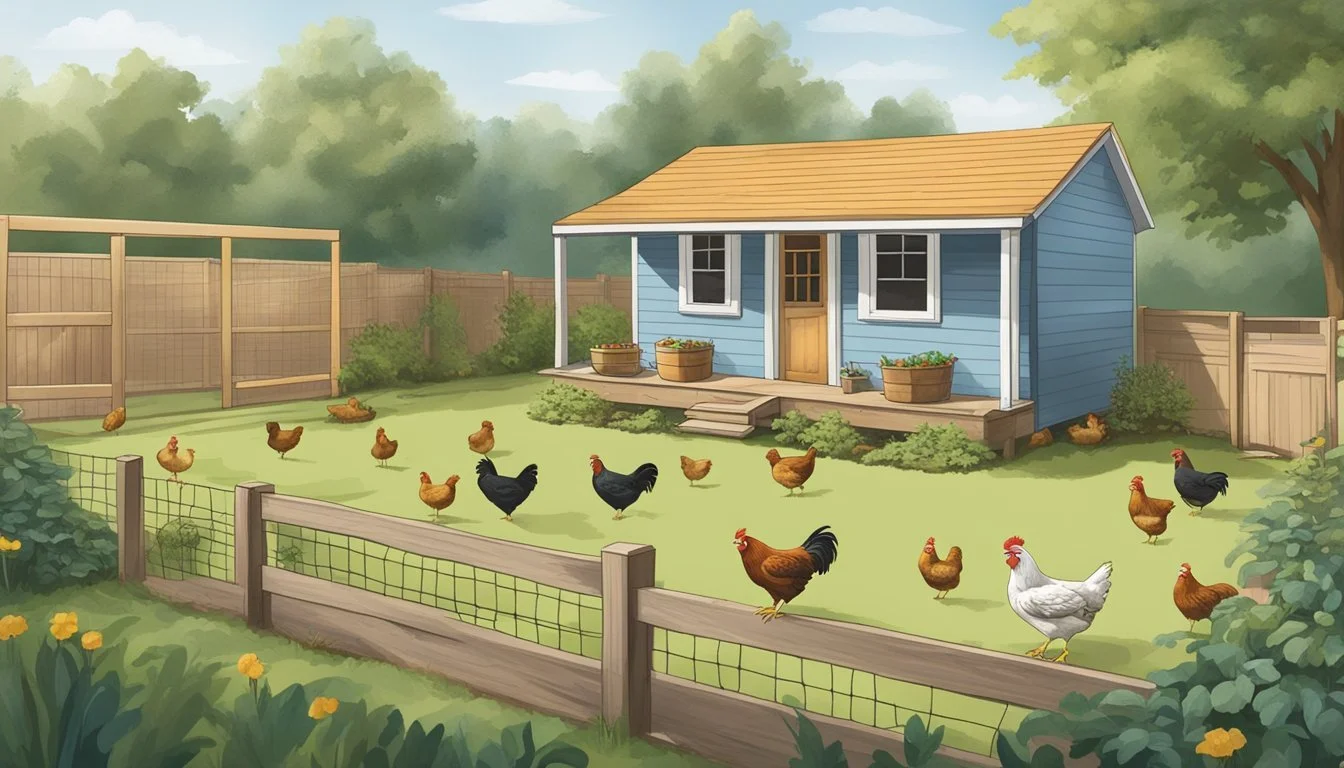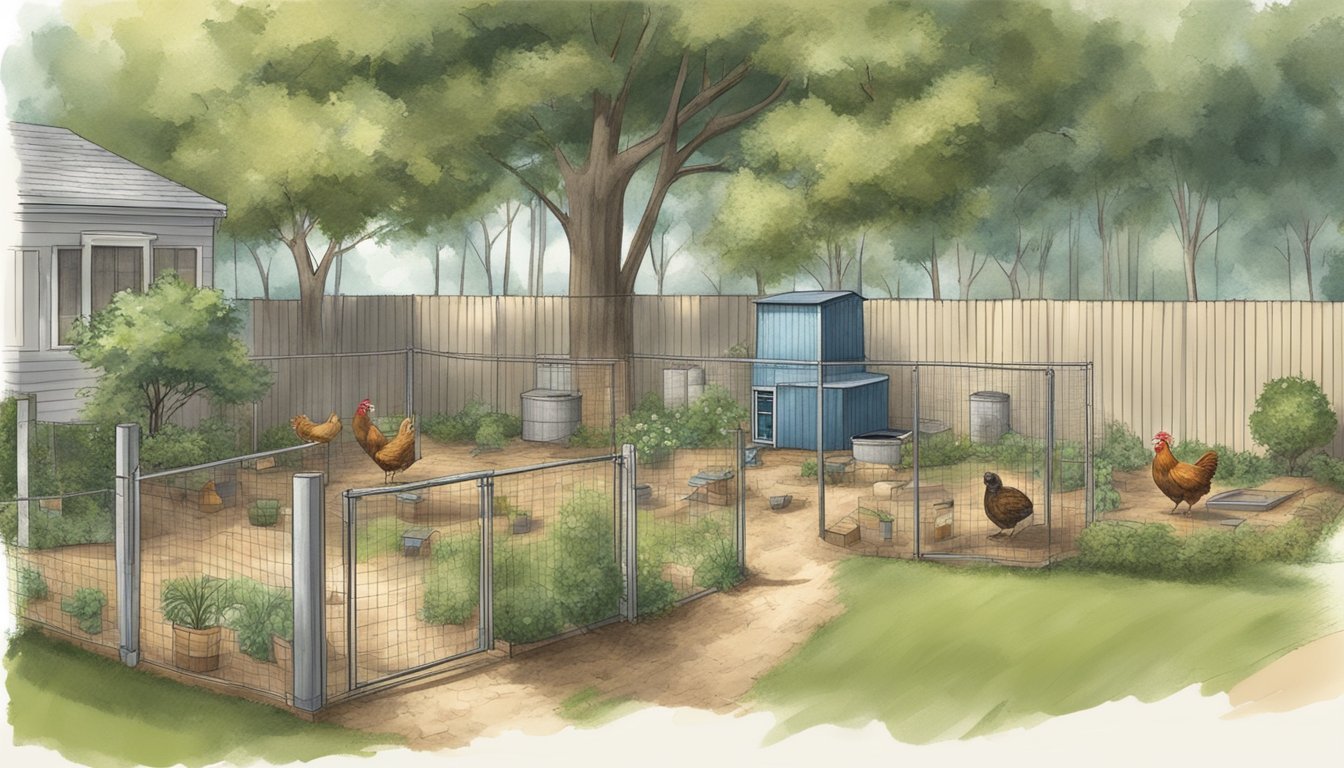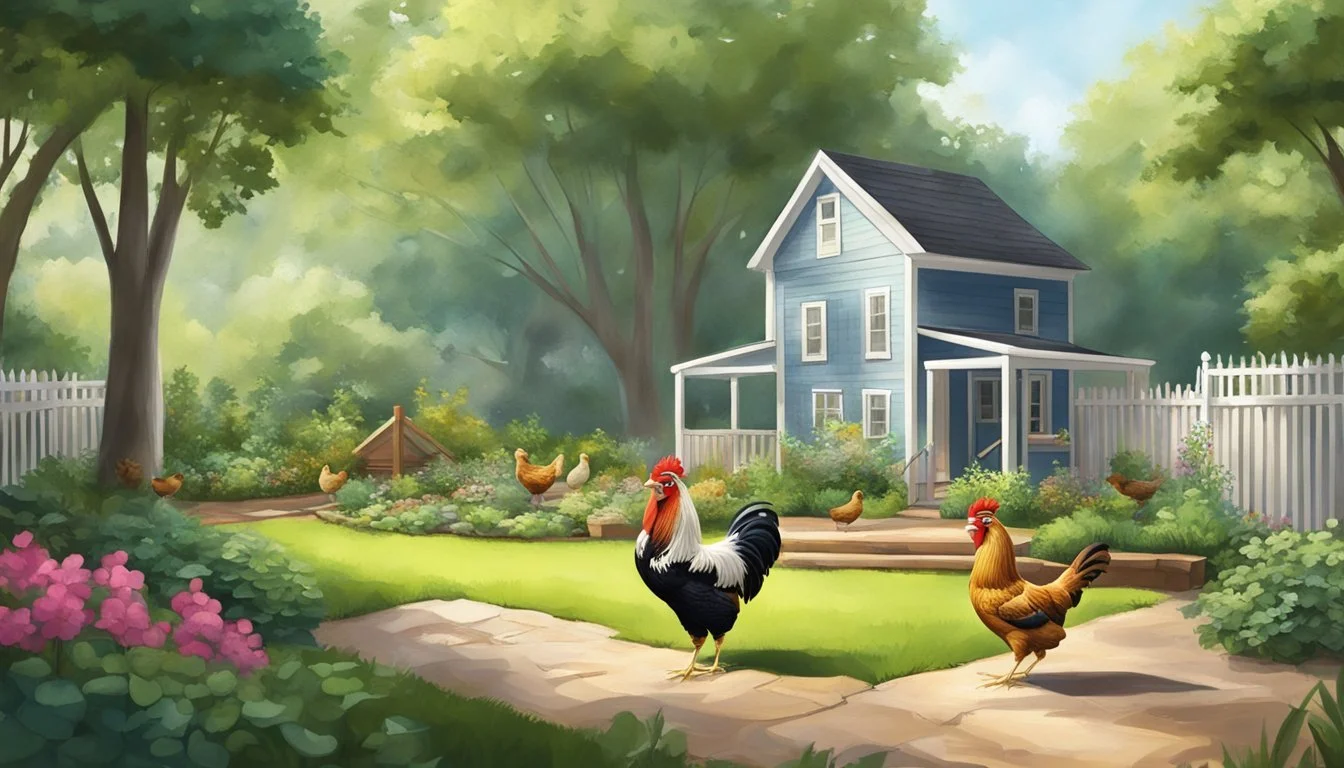Keeping Backyard Chickens in Columbia, SC
Essential Guidelines for Urban Poultry Farming
Raising backyard chickens has become an increasingly popular practice for residents of Columbia, South Carolina seeking a more sustainable lifestyle, fresh eggs, and the joy of caring for these birds. In response to this trend, the City of Columbia has established specific guidelines to regulate the keeping of chickens within city limits. These regulations are designed to ensure the well-being of the chickens, the interests of the residents, and the overall health of the community.
In Columbia, individuals aiming to keep chickens in their backyards must adhere to the city's ordinances. Residents are permitted to have a maximum of four chickens (hens only), with roosters being prohibited to avoid noise disturbance. To begin raising chickens, one must navigate several bureaucratic steps, including obtaining a zoning permit from the planning and development services department and securing a certificate of inspection from the animal control division.
Such ordinances serve multiple purposes: they help to maintain harmony among neighbors, protect public health, and provide a framework for animal welfare. As with any city regulation, these rules are subject to change, and it is crucial for current and prospective chicken owners to stay informed about the latest requirements. For those looking to venture into the world of backyard poultry, understanding and complying with these local laws is the first step toward a rewarding experience with chickens in Columbia.
Legal Framework in Columbia, SC
The City of Columbia has specific ordinances that govern the keeping of backyard chickens, which require residents to understand and comply with local laws. These regulations include obtaining the necessary permits and adhering to restrictions regarding the number of chickens and property line boundaries.
Understanding the City Ordinances
Columbia, SC, has established city ordinances to regulate the keeping of chickens within city limits. According to these rules, residents are allowed to keep chickens but are required to follow certain guidelines to ensure health, safety, and community harmony. Roosters are typically not permitted due to noise concerns.
Permit Requirements for Keeping Chickens
Before acquiring chickens, one must obtain a zoning permit from the planning and development services department. Additionally, the animal control division must issue a certificate of inspection. These permits ensure that the coop design and location comply with city requirements.
Assessing Restrictions and Bans
The City of Columbia does not allow an unrestricted number of chickens to be kept. There are limits in place: typically, a maximum of four hens per premise. Bans on roosters and regulations on coop placement relative to neighboring residences help minimize disturbances.
Zoning and Property Line Guidelines
Strict adherence to zoning and property lines is necessary when setting up chicken coops. The coop must have a minimum square footage of floor area of two square feet per hen and must not be less than 18 inches in height. Moreover, coops should be located following the specific city code to respect the distance from neighboring properties.
Setting Up Your Chicken Coop
When establishing a backyard chicken coop in Columbia, South Carolina, it's crucial to consider location, construction, and maintenance to ensure a healthy environment for your chickens. This not only adheres to local ordinances but also promotes the well-being of your flock.
Choosing the Right Location
In Columbia, the maximum number of chickens allowed is 4, and roosters are not permitted due to noise ordinances. When selecting a location for your chicken coop:
Ensure it is built on high ground to prevent waterlogging and flooding.
It should be well-ventilated to maintain air quality.
Position the coop to receive ample sunlight but provide shade to prevent overheating.
Coop Construction and Design
Your coop must be secure and functional:
Design the coop with a connected run to allow chickens safe outdoor access.
Coop requirements include adequate space for each hen, nesting boxes, and perches.
Building materials should resist local weather conditions and predators.
A certificate of inspection may be required, proving the coop meets all city regulations.
Maintaining a Clean and Healthy Environment
A clean coop is imperative for a healthy flock:
Regular inspection and cleaning to prevent disease and parasite infestation.
Provide easy access for cleaning and egg collection.
Bedding should be kept dry and changed frequently to maintain a clean environment.
A well-designed backyard coop ensures the containment and management of waste.
Flock Management
Proper management of a backyard chicken flock in Columbia, SC involves careful consideration of the flock size, daily care routines for optimal health, and strategies for controlling noise and odors to maintain good neighborly relations.
Deciding the Number of Hens
The optimal number of hens in a backyard flock depends on space availability and local regulations. Hobbyists should provide 4 square feet of coop space per hen and 8-10 square feet of outdoor space per hen to ensure adequate room for movement and to prevent stress and health issues. Columbia residents must verify compliance with local ordinances regarding the allowable number of female chickens, ensuring the flock's size is within legal limits.
Daily Care and Chickens' Health
Chickens require consistent daily care that includes feeding, watering, and monitoring for signs of illness. Feeding them a balanced chicken feed specifically designed for layers ensures hens receive the necessary nutrients for health and egg production. A daily checklist should include:
Observing each chicken for normal behavior and signs of distress.
Providing fresh water and refilling feeders with the appropriate chicken feed.
Cleaning the coop to maintain hygiene and prevent disease.
Checking for external parasites and treating accordingly.
Managing Noise and Odors
Noise and odors are two key concerns for urban and suburban chicken keepers. To mitigate noise, they should mainly keep hens, which are generally quieter than roosters. Implementing a regular coop cleaning schedule prevents the buildup of waste, which can cause unpleasant odors. Using strategic coop placement away from neighbors and natural odor-controlling methods like proper ventilation and adding carbon-rich materials (such as straw or wood shavings) to the litter can effectively reduce odor issues.
Community Guidelines and Responsibilities
In Columbia, SC, residents who aspire to keep backyard chickens must adhere to specific guidelines that align with homeowners association policies, maintain good relations with neighbors, and ensure compliance with local regulations.
Homeowners Association Policies
Residents must first verify with their Homeowners Association (HOA) if backyard chickens are permitted within their community. HOA guidelines often dictate the number of chickens allowed, coop specifications, and placement in relation to property lines. It is crucial to obtain written permission if required, to avoid future disputes.
Considering Neighbors and Residential Relations
Neighboring residences should be considered when keeping backyard chickens. Owners must ensure their coops are well-maintained to prevent odors and noise that could impact neighbors. Setting coops away from property lines and consulting neighbors can foster amicable relationships and respect for residential privacy.
Inspection and Compliance with Regulations
Chickens must be housed in a coop meeting the minimum size requirement of two square feet per hen, as per Columbia regulations. Regular inspection by the city or designated authorities ensures that chicken keepers maintain healthy standards and management practices. Compliance includes managing waste, controlling feed to deter rodents, and keeping the coop confined to the owner's residential property without encroaching on public spaces or neighbor's yards.
Challenges and Considerations
Keeping backyard chickens in Columbia, SC involves careful planning and awareness of several important aspects. This section explores how to protect your chickens, what to consider during different seasons, and understanding the latest legal expectations.
Protecting Chickens from Predators
Chickens are often targeted by various predators such as raccoons, foxes, and hawks. Ensuring the safety of your flock requires sturdy coop construction with secure latches. Regular checks on the integrity of chicken enclosures can prevent unwanted attacks, keeping the chickens safe and happy.
Weather and Seasonal Concerns
Winter can bring challenges to the health and egg production of backyard chickens. Adequate shelter and provisions to ward off the cold are crucial. A lamp may be necessary to maintain warmth and continue the supply of fresh eggs, but one must ensure it is safely installed to avoid fire hazards.
Legal Changes and Updates
Staying informed about current and changing backyard chicken laws is vital for compliance and the well-being of your flock. The local regulations last updated on 10/31/2023 must be adhered to, which dictate the number of chickens allowed and the rules for coop placement. Regularly reviewing Columbia's chicken laws ensures that you remain a responsible chicken owner.
Egg Production and Consumption
In Columbia, SC, residents who keep chickens often do so for the supply of fresh eggs. Fresh eggs from backyard chickens can be more nutritious with deeper colored yolks and richer flavor compared to store-bought ones. One popular breed for egg production is the Leghorn, known for its prolific laying abilities.
Egg production follows a typical curve, peaking early and gradually declining. A backyard flock primarily of Leghorns may start laying at about 4-6 months of age, with peak production occurring shortly thereafter. Here's an overview of the expected egg production:
Year 1: High production, smaller eggs
Year 2: Production begins to decline, larger eggs
Year 3-4: Further reduced production, egg size may increase, shell quality can decrease
Egg-laying frequency also varies with season and weather conditions, often decreasing in colder months. In Columbia, where the climate is relatively mild, egg production might not face drastic seasonal drops.
When consuming eggs from backyard chickens, safety is paramount. Residents should ensure eggs are collected promptly, cleaned, and stored at proper temperatures to minimize the risk of salmonella and other bacteria.
Hens in Columbia can lay a variety of egg colors depending on the breed—but Leghorns are known for their white eggs. It's important for chicken keepers to manage their expectations regarding egg production and to plan for a natural decrease in laying frequency as hens age.
More Information and Resources
When considering backyard chicken keeping in Columbia, SC, knowing where to find accurate information and resources is crucial. This section provides details on whom to contact and where to look, ensuring compliance with local ordinances and successful poultry management.
Contacting Columbia City Officials
For residents of Columbia looking to keep backyard chickens, the City Hall and the Zoning Office are the primary points of contact for inquiries about local ordinances. Interested parties should:
City Hall: Reach out to Columbia City Hall for general information regarding city ordinances and to ensure that backyard chicken keeping is allowed in their specific address.
Phone: 803-545-3000
Address: 1737 Main St, Columbia, SC 29201
Zoning Office: Consult the Zoning Office for detailed information on any specific zoning regulations that affect poultry keeping, such as space requirements and restrictions.
Phone: 803-545-3333
Email: zoning@columbiasc.net
Resources Outside Columbia
For individuals residing in other areas of South Carolina such as Spartanburg, Greenville, or the other listed regions, researching the specific chicken laws of their localities is important. Resources can vary widely from city to city. Here’s a regional breakdown:
Spartanburg, Greenville, Charleston, North Charleston, Mount Pleasant: These urban areas may have specific requirements or restrictions. It is advisable to check their respective city or municipal websites or contact local officials.
Summerville, Sumter, Greer, Lexington, West Columbia: Smaller cities like these often have their own sets of rules. The town council or city zoning offices are good starting points for gathering information.
Rural Areas: In more agricultural zones, such as rural parts of Maine and other less densely populated areas of South Carolina, regulations might be less stringent. However, checking with local agricultural extensions is key.
Maine: For comparison, looking into the chicken laws of states like Maine can offer insights into how regulations differ in rural versus urban areas.
In all cases, future chicken owners should understand that keeping backyard chickens requires a commitment not only to the animals' well-being but also to the adherence to local laws and neighborhood harmony.
Conclusion
In Columbia, SC, residents interested in raising backyard chickens must adhere to specific regulations. These are aimed at ensuring the health and safety of both the chickens and the local community. Individuals may keep up to four hens on their property, while roosters are notably excluded due to noise considerations.
Before starting a backyard flock, residents must obtain a zoning permit and a subsequent certificate of inspection from the animal control division. This two-fold process ensures that potential chicken keepers are compliant with local ordinances and that the animals' living conditions meet the required standards.
It's important to note the health implications involved in raising chickens. Salmonella is a potential risk, and as such, maintaining good hygiene practices is essential. This includes regular hand washing after handling chickens or eggs and ensuring the coop is kept clean.
Lastly, individuals should be aware of the varying responsibilities when comparing chickens to more traditional pets such as cats or dogs. They provide fresh eggs and can be enjoyable pets but require a different approach to care and husbandry.
Those considering backyard chickens must appreciate these responsibilities and legal requirements to create a safe and harmonious environment for both their families and their flocks.









